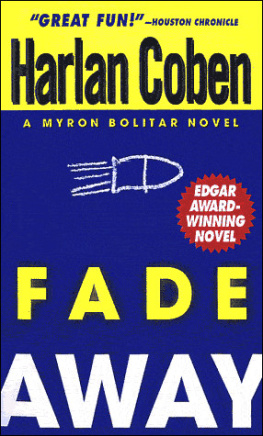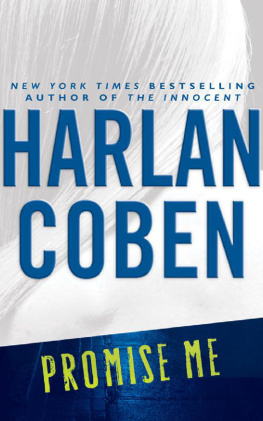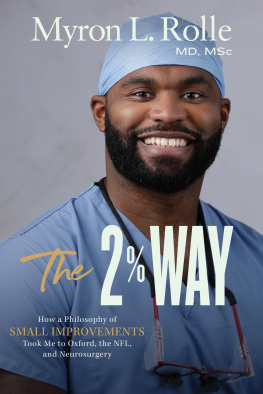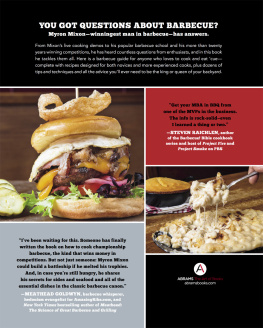One False Move
Myron 05
Harlan Coben
September 15
The Cemetery Overlooked A Schoolyard.
Myron Pushed At The Loose Dirt With The Toe Of His Rockport. There was no stone here yet, just a metal marker holding a plain index card with a name typed in capital letters. He shook his head. Why was he standing here like some cliche from a bad TV show? In his mind's eye Myron could see how the whole scene should be played out. Torrential rain should be pounding on his back, but he would be too bereaved to notice. His head should be lowered, tears glistening in his eyes, maybe one running down his cheek, blending in with the rain. Cue the stirring music. The camera should move off his face and pull back slowly, very slowly, showing his slumped shoulders, the rain driving harder, more graves, no one else present. Still pulling back, the camera eventually shows Win, Myron's loyal partner, standing in the distance, silently understanding, giving his buddy time alone to grieve. The TV image should suddenly freeze and the executive producer's name should flash across the screen in yellow caps. Slight hesitation before the viewers are urged to stay tuned for scenes from next week's episode. Cut to commercial.
But that would not happen here. The sun shone like it was the first day and the skies had the hue of the freshly painted. Win was at the office. And Myron would not cry.
So why was he here?
Because a murderer would be coming soon. He was sure of it.
Myron searched for some kind of meaning in the landscape but only came up with more cliches. It had been two weeks since the funeral. Weeds and dandelions had already begun to break through the dirt and stretch toward the heavens. Myron waited for his inner voice-over to spout the standard drivel about weeds and dandelions representing cycles and renewal and life going on, but the voice was mercifully mute. He sought irony in the radiant innocence of the schoolyard - the faded chalk on black asphalt, the multicolor three-wheelers, the slightly rusted chains for the swings -cloaked in the shadows of tombstones that watched over the children like silent sentinels, patient and almost beckoning. But the irony would not hold. Schoolyards were not about innocence. There were bullies down there too and sociopaths-in-waiting and burgeoning psychoses and young minds filled prenatally with undiluted hate.
Okay, Myron thought, enough abstract babbling for one day.
On some level, he recognized that this inner dialogue was merely a distraction, a philosophical sleight of hand to keep his brittle mind from snapping like a dry twig. He wanted so very much to cave in, to let his legs give way, to fall to the ground and claw at the dirt with his bare hands and beg forgiveness and plead for a higher power to give him one more chance.
But that too would not happen.
Myron heard footsteps coming up from behind him. He closed his eyes. It was as he expected. The footsteps came closer. When they stopped, Myron did not turn around.
'You killed her,' Myron said.
'Yes.'
A block of ice melted in Myron's stomach. 'Do you feel better now?'
The killer's tone caressed the back of Myron's neck with a cold, bloodless hand. 'The question is, Myron, do you?'
August 30
Myron hunched his shoulders and slurred his words. 'I am not a baby-sitter,' he said. 'I am a sports agent.'
Norm Zuckerman looked pained. 'Was that supposed to be Bela Lugosi?'
'The Elephant Man,' Myron said.
'Damn, that was awful. And who said anything about being a baby-sitter? Did I say the word baby-sitter or baby-sitting or for that matter any form of the verb to baby-sit or noun or even the word baby or the word sit or sat orGCo'
Myron held up a hand. 'I get the point, Norm.'
They sat under a basket at Madison Square Garden in those cloth-and-wood directors' chairs that have stars' names on the back. Their chairs were set high so that the net from the basket almost tickled Myron's hair. A model shoot was going on at half-court. Lots of those umbrella lights and tall, bony women-cum-children and tripods and people huffing and fluffing about. Myron waited for someone to mistake him for a model. And waited.
'A young woman may be in danger,' Norm said. 'I need your help.'
Norm Zuckerman was approaching seventy and as CEO of Zoom, a megasize sports manufacturing conglomerate, he had more money than Trump. He looked, however, like a beatnik trapped in a bad acid trip. Retro, Norm had explained earlier, was cresting, and he was catching the wave by wearing a psychedelic poncho, fatigue pants, love beads, and an earring with a dangling peace sign. Groovy, man. His black-to-gray beard was unruly enough to nest beetle larvae, his hair newly curled like something out of a bad production of Godspell.
Che Guevara lives and gets a perm.
'You don't need me,' Myron said. 'You need a bodyguard.'
Norm waved a dismissing hand. 'Too obvious.'
'What?'
'She'd never go for it. Look, Myron, what do you know about Brenda Slaughter?'
'Not much,' Myron said.
He looked surprised. 'What do you mean, not much?'
'What word are you having trouble with, Norm?'
'For crying out loud, you were a basketball player.'
'So?'
'So Brenda Slaughter may be the greatest female player of all time. A pioneer in her sport - not to mention the pinup girl, pardon the political insensitiv-ity, for my new league.'
'That much I know.'
'Well, know this: I'm worried about her. If something happens to Brenda Slaughter, the whole WPBA - and my substantial investment - could go right down the toilet.'
'Well, as long as it's for humanitarian reasons.'
'Fine, I'm a greedy capitalist pig. But you, my friend, are a sports agent. There is not a greedier, sleazier, slimier, more capitalist entity in existence.'
Myron nodded. 'Suck up to me,' he said. 'That'll work.'
'You're not letting me finish. Yes, you're a sports agent. But a damn fine one. The best, really. You an d t he Spanish shiksa do incredible work for your clients. Get the most for them. More than they should get really. By the time you finish with me, I feel violated. Hand to God, you're that good. You come into my office, you rip off my clothes and have your way with me.'
Myron made a face. 'Please.'
'But I know your secret background with the feds.'
Some secret. Myron was still hoping to bump into someone above the equator who didn't know about it.
'Just listen to me for a second, Myron, okay? Hear me out. Brenda is a lovely girl, a wonderful basketball player - and a pain in my left tuchis. I don't blame her. If I grew up with a father like that, I'd be a pain in the left tuchis too.'
'So her father is the problem?'
Norm made a yes-and-no gesture. 'Probably.'
'So get a restraining order,' Myron said.
'Already done.'
'Then what's the problem? Hire a private eye. If he steps within a hundred yards of her, call the cops.'
'It's not that easy.' Norm looked out over the court. The workers involved in the shoot darted about like trapped particles under sudden heat. Myron sipped his coffee. Gourmet coffee. A year ago he never drank coffee. Then he started stopping into one of the new coffee bars that kept cropping up like bad movies on cable. Now Myron could not go through a morning without his gourmet coffee fix.
There is a fine line between a coffee house and a crack house.
'We don't know where he is,' Norm said.
'Excuse me?'
'Her father,' Norm said. 'He's vanished. Brenda is always looking over her shoulder. She's terrified.'
'And you think the father is a danger to her?' 'This guy is the Great Santini on steroids. He used to play ball himself. Pac Ten, I think. His name isGCo"
'Horace Slaughter,' Myron said.
'You know him?'
Next page
